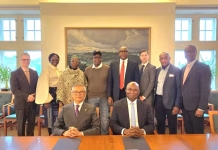Vice President Yemi Osinbajo on Thursday urged governments at all levels to reduce their dependence on oil revenues, saying such practice over the years had encouraged laziness.
Speaking at the launching of the Standard Operating Procedures (SOPs) and Port Services Support Portal (PSSPs) for Nigerian Ports, Osinbajo said the continued reliance on oil as easy source of revenue denied the country opportunity to engage in critical thinking and prioritize national development issues.
According to him, not relying on oil would require alternative revenue sources and diversification of the country’s economic base, in terms of the drivers of economic activity and sources of foreign exchange earnings.
He commended the ministry of transportation for adopting the new technology-based monitoring system in its operations, adding thag this had set Nigeria on the path to enhance its ports capacity, by ensuring free flow of import and export, reducing corruption in port procedures and adopting the global best practice.
He advised all port operators to support the new system for effectiveness of ports operations, increased revenue, enhancement of diversification programme of government and curbing corruption.
The vice president noted that using technology-driven products was the best way forward in enhancing service delivery in both private and public sectors.
“Everyone in the private and public sector must invest their commitment in the successful implementation of the SOPs and PSSPs by following the procedure, not engaging in corrupt practices and putting an extra effort to ensure that the objectives are accomplished,” he said.
“We must understand and accept that nation-building is a collective responsibility and that the private sector has an important role to play in supporting every effort of government to achieve the building of a strong and virile nation.’’
He pledged the present administration’s resolve to continue encouraging a competitive business environment characterized by sufficient and efficient policies to sustain economic growth to further retain and attract local and foreign investments in Nigeria.
Mr. Osinbajo said that a key component of the present administration’s change agenda was in the development of a diversified non-oil economy, pointing out that to achieve the target, the country’s ports must play their role in making it easier to trade across borders as well as drive Nigeria’s trade policy.
“Many countries in the world had proved that without natural resources, the efficient management of import and export activities could greatly improve national economies.
Many countries have proven that without depending on any natural resources, but simply relying on efficient procedures for undertaking port activities, any nation can position itself as a major hub and can earn significant resources by just being more efficient,” he noted.












